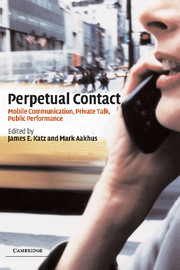Book contents
- Frontmatter
- Contents
- List of figures
- List of tables
- Notes on the contributors
- Preface and acknowledgments
- 1 Introduction: framing the issues
- PART I Mobile communication: national and comparative perspectives
- PART II Private talk: interpersonal relations and micro-behavior
- PART III Public performance: social groups and structures
- 14 The challenge of absent presence
- 15 From mass society to perpetual contact: models of communication technologies in social context
- 16 Mobiles and the Norwegian teen: identity, gender and class
- 17 The telephone comes to a Filipino village
- 18 Beginnings in the telephone
- 19 Conclusion: making meaning of mobiles – a theory of Apparatgeist
- Appendixes
- Index
- References
15 - From mass society to perpetual contact: models of communication technologies in social context
Published online by Cambridge University Press: 22 September 2009
- Frontmatter
- Contents
- List of figures
- List of tables
- Notes on the contributors
- Preface and acknowledgments
- 1 Introduction: framing the issues
- PART I Mobile communication: national and comparative perspectives
- PART II Private talk: interpersonal relations and micro-behavior
- PART III Public performance: social groups and structures
- 14 The challenge of absent presence
- 15 From mass society to perpetual contact: models of communication technologies in social context
- 16 Mobiles and the Norwegian teen: identity, gender and class
- 17 The telephone comes to a Filipino village
- 18 Beginnings in the telephone
- 19 Conclusion: making meaning of mobiles – a theory of Apparatgeist
- Appendixes
- Index
- References
Summary
My subject here is partly technology and partly the history of ideas. It has to do, on the one hand, with the characteristics and possibilities of the technologies of perpetual contact. It also has to do with the succession of theoretical models that have shaped understanding of communications technologies in the past, and promise to do so in the future. If we are to grasp the role of technology in changing the social world, it helps to take stock of where the concepts for understanding that role come from. And if we can get a grip on the uses and failures of models that shaped the thinking of earlier decades, perhaps we will have a shrewder approach to modeling the technologies of the future.
The first model from the past that I want to evoke is that of mass society. From the end of the nineteenth century to roughly the 1960s, social critics held it axiomatic that the world's “advanced” societies were dominated by mass processes. In this view, populations of these societies were constantly at risk of manipulation from remote, powerful government and corporate organizations. The medium of this overbearing influence was mass communication, understood as the large-scale transmission of standardized, over-simplified, emotion-charged stimuli. Citizens were seen as likely to be subjected to mind-deadening, manipulative messages via the press, broadcasting and mass political parties.
- Type
- Chapter
- Information
- Perpetual ContactMobile Communication, Private Talk, Public Performance, pp. 242 - 254Publisher: Cambridge University PressPrint publication year: 2002
References
- 9
- Cited by



